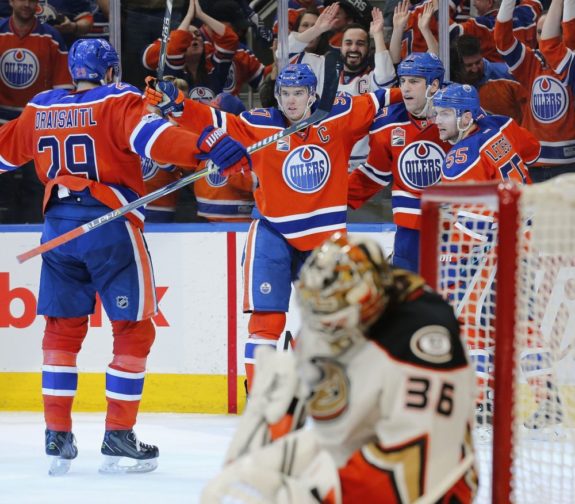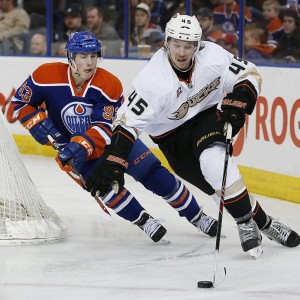With their win against the San Jose Sharks yesterday, the Edmonton Oilers punched their ticket to the second round of the playoffs. The Anaheim Ducks have been off since last Thursday, awaiting the winner of the Sharks-Oilers series after sweeping the Calgary Flames last week.
The sweep, however, was not indicative of how competitive the series actually was. Every game could have gone the other way, particularly Game 3, when the Ducks were able to force overtime after coming back from a 4-1 deficit. Each game was decided by one goal, with the exception of Game 4 after Ryan Getzlaf scored an empty-netter to bring the score up 3-1.
For the next round, the Ducks are going to have to be more dominant if they want to see the Western Conference Final. The Ducks are 2-1-2 against the Oilers this season. Lucky for the Ducks, there is no 3-on-3 overtime during the playoffs, where the Oilers had an obvious edge during the regular season.
Here are three keys to the series for the Ducks:
1. Frustrate the Oilers’ Young Core

The Oilers are built using the same formula as the Flames; both rely on a young, speedy core group of players. If you look at this chart, organized by weighted average age of NHL teams, you will see that the Oilers are the seventh youngest group.
The Flames were only slightly younger than the Ducks, but the Oilers were significantly younger than the Sharks, who are the oldest team using the weighted metric. The Oilers used their speed to get through a slow and ageing Sharks team to win the series. The Ducks, who aren’t as old but are built in a similar way to the Sharks, filled with experienced, hard-hitting players, also do not match up well against speed. They will have to keep the Oilers out of the middle of the ice much like they did with the Flames to prevent their speed.
In the series against the Flames, the Ducks were able to frustrate them with their physicality and made them take dumb penalties. During Game 4 of the Sharks and Oilers series, the Oilers’ inexperienced youth behaved in the same way as the Flames did when confronted with adversity. The Sharks demolished the Oilers 7-0, with four goals scored on the power play. The Oilers took eight penalties in that game, compared to the Sharks’ four, the most notable of which was a spearing call on an obviously flustered 21-year-old Leon Draisaitl:
2. Shutdown Connor McDavid
In Game 4 against the Sharks, Connor McDavid acted unlike Connor McDavid. He took a stupid penalty, leading to the Sharks’ third goal, and second on the power play, of the evening. Still, he finished the series with two goals and two assists, while linemate Draisaitl finished with one goal and two assists.
That game showed that he can also be easily frustrated. For the Ducks-Oilers series, Ryan Kesler will have a new best friend as he is sure to be matched up against McDavid, much like he was against the Flames’ Johnny Gaudreau. Because of Kesler’s constant tailing – the man is a Selke trophy finalist, after all – Gaudreau was very quiet, finishing the series without a goal and only two assists.
Kesler is a pest. He can frustrate even the most poised player, and McDavid has shown his youth and inexperience at times. However, against the Ducks, he has been pretty successful. This season, he scored two goals and five assists, including this goal, when he capitalized on a mistake by Kesler:
After Kesler missed an attempt to clear the puck from in front of the net, McDavid was able to score the first goal of the game before going on to assist on the game-winning goal in overtime by Draisaitl. Even more dangerous to the Ducks is Draisaitl, who scored six goals, at least one in each game, and two assists against them. The Ducks hope is to frustrate McDavid and Draisaitl and throw them off their game.
3. Don’t Get Rusty
Because of the sweep against the Flames, the Ducks could be off for about a week before the beginning of Round 2. There are pros and cons to the long break. For one, the Ducks could see the return of Sami Vatanen and Cam Fowler, both of whom were missed on defense. Both of whom will also be essential in shutting down the speedy Oilers. At 5’10 and 183 pounds, Vatanen is one of the Ducks’ smaller and quicker defencemen, while Fowler is a major factor on the Ducks penalty kill, which took a beating against the Flames.
Vatanen hasn’t played since Game 1 of the playoffs because of an upper-body injury, while Fowler has been out since April 4 due to a knee injury. It had been reported that he could return in 2-6 weeks, but he has started skating again. Vatanen was listed as day-to-day and is almost certainly going to return for the next round.

The downside to the lengthy break is that the Ducks could get rusty without seeing action for so long. In the beginning of March, the Ducks took their mandatory 5-game bye week, a new idea the NHL is testing this season. It didn’t work out well. Teams were 10-16-4 on their first game back from their breaks.
Luckily for the Ducks, they were one of the few teams that notched a victory in their first game back. After their bye week, the Ducks finished the season with a 14-2-3 record, so perhaps that break served them well.
Even though the Ducks may have matched up better against the Sharks, the Oilers are a similar team to the Flames, who the Ducks made quick work of. If the Ducks are able to play the same way they did against the Flames, they should also be able to take down the Oilers.